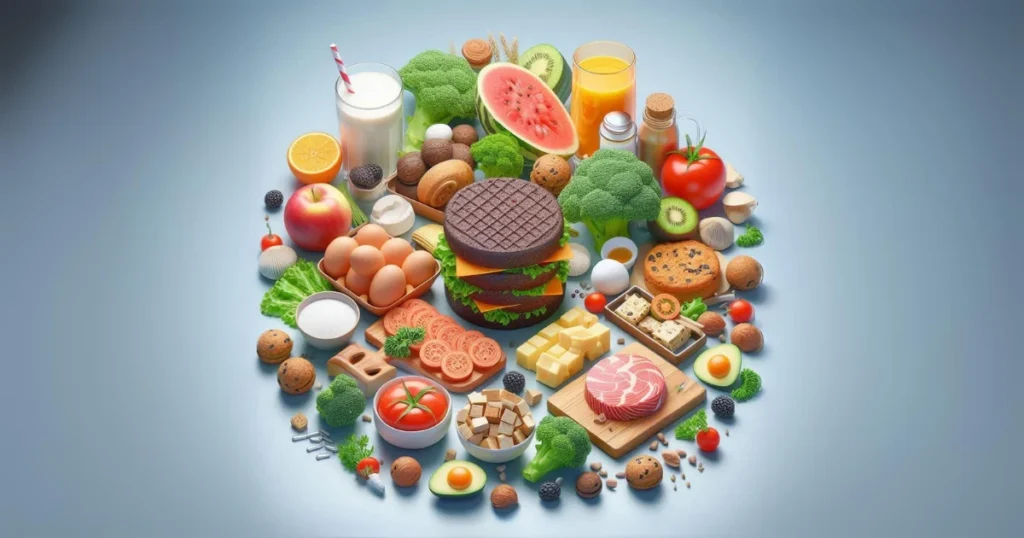
The ketogenic diet is becoming more and more common because it might help people lose weight and control their blood sugar.
There are also early signs that this low-carb, high-fat diet may help treat some types of cancer, Alzheimer’s disease, and other health problems. However, further comprehensive research is required to determine the long-term safety and effectiveness of the keto diet.
The keto diet typically limits daily carbohydrate intake to 20 to 50 grams.
Net carbs are what some people on keto count, while total carbs are what others count. The term “net carbs” means “total carbs minus fiber.” Fiber is not edible, which means your body can’t break it down and use it. This diet might look hard, but people who follow it can eat a lot of healthy things.
Keto Friendly Foods
Here are 10 keto-friendly foods that are good for you.
1. Seafood
Seafood and fish are great for people on the keto diet. Not only do salmon and other fish have almost no carbs, but they also have a lot of selenium, potassium, and B vitamins.
However, the carbohydrate content varies among different types of shrimp. Oysters and squid have carbs, but shrimp and most crabs don’t. Even though you’re on the keto diet, you can still eat these things. Just make sure you keep track of the carbs you eat to stay within your range.
Also, salmon, sardines, mackerel, and other fatty fish are very high in omega-3 fats. Studies have linked individuals who are overweight or obese to lower insulin levels and improved insulin sensitivity.
Regular fish consumption is associated with improved brain health and a decreased risk of illness.
The American Heart Association says that people over the age of 18 should eat 8 to 10 ounces of seafood every week.
2. Eggs
A very healthy way to get protein is to eat eggs.
Eggs can be great for keto because each big egg has about 6 grams of protein and less than 1 gram of carbs.
In addition, studies have shown that eggs produce proteins that increase feelings of fullness.
The yolk of an egg has most of the nutrients, so it’s better to eat whole eggs instead of egg whites. Antioxidants such as lutein and zeaxanthin are included because they are good for your eyes.
Egg yolks have a lot of cholesterol but don’t seem to cause heart disease.
3. Cheese
Lots of different kinds of cheese are low in carbs and high in fat, so they are great for people on the keto diet.
It has a good amount of calcium, 1 gram of carbs, and 6 grams of protein in just 1 ounce (28 grams).
Despite its high saturated fat content, studies have not shown that cheese increases the risk of heart disease. Some studies even show that it might help keep you from getting this problem.
Cheese also contains CLA, which has been associated with fat loss and body transformation.
Also, eating cheese on a daily basis might help slow down the loss of muscle mass and strength that comes with getting older.
A 12-week study of older people found that those who ate 7 ounces (210 grams) of ricotta every day lost less muscle mass and strength than those who didn’t eat more cheese.
4. Plant-based milk
Soy, almond, and coconut milk are all types of plant-based milk that are good for keto dieters. Choose unsweetened options. Sweetened options contain too much sugar to be keto-friendly.
You should also stay away from oat milk; even plain oat milk has too many carbs to be keto-friendly.
5. Green leafy vegetables
Green, leafy vegetables are an exceptional choice for ketogenic diets due to their exceptionally low carbohydrate content. Additionally, they are abundant in antioxidants, minerals, and vitamins.
Dark leafy greens, including spinach, kale, and collard greens, are particularly rich in iron and vitamin K.
Greens add bulk to your dishes without significantly increasing the carbohydrate content. Furthermore, herbs like rosemary and oregano contribute substantial flavor without requiring significant carbohydrates.
The following verdant greens are keto-friendly:
- Salad greens: escarole, frisee, arugula, baby spinach, and lettuce
- Cooking greens include bok choy, collard greens, mustard greens, kale, spinach, Swiss chard, and cabbage.
- Herbs: basil, rosemary, thyme, sage, mint, oregano, dill, parsley, cilantro, and lemongrass
6. Summer squash
Summer squashes, including zucchini and yellow squash, are very adaptable and low in carbohydrates.
Zucchini is exceedingly prevalent in keto diets. Zucchini noodles are an exceptional substitute for pasta or noodles when prepared with a spiralizer.
You can grate zucchini to make a rice substitute or incorporate it into baked products without changing their flavor. Additionally, it is possible to delicately slice it using a mandoline and then combine it with olive oil, salt, and pepper to serve as a cold salad.
7. Peppers
There are numerous pepper varieties that are suitable for the keto diet. The culinary arts regard them as vegetables, despite their classification as fruits.
Jalapeños are the perfect choice for creating keto-friendly appetizers, while small hot peppers lend a spicy kick to recipes. You have the option of incorporating larger, moderate peppers, such as poblanos and bell peppers, into a variety of dishes, or stuffing them to create flavorful, low-carb main dishes.
Additionally, peppers are an abundant source of vitamin C. For example, a single bell pepper contains 107% of the recommended daily intake (RDI) of vitamin C.
8. Nuts and seeds
Nuts and seeds are nutrient-dense, high in fat, and low in carbohydrates.
Frequent consumption of nuts is associated with a decreased risk of developing heart disease, certain types of cancer, melancholy, and other chronic diseases.
Furthermore, the high fiber content of nuts and seeds can help with the sensation of fullness and a natural reduction in calorie intake.
While most nuts and seeds are low in net carbs, the quantity fluctuates significantly depending on the type. The lowest in carbohydrates, and as a result, the most suitable for ketogenic diets, are
- almonds
- macadamia nuts
- pecans
- walnuts
- chia seeds
- flaxseeds
9. Butter and ghee
Butter and ghee are beneficial lipids to incorporate into a ketogenic diet. Ghee is entirely carb-free, while butter contains only trace quantities of carbohydrates.
By heating butter and removing the milk solids that float to the surface, we produce ghee, a form of clarified butter. Indian cuisine frequently uses it for its concentrated buttery flavor.
According to recent research, butter and ghee are not as detrimental to one’s health as previously believed, similar to other forms of full-fat dairy.
10. Unsweetened coffee and tea
Coffee and tea are beverages that are both nutritious and carb-free.
They contain caffeine, which can enhance your physical performance, alertness, and mood by increasing your metabolism.
Additionally, research has demonstrated that individuals who consume coffee and tea have a substantially lower risk of developing diabetes. Despite the lack of a clear cause-and-effect relationship, those who consume the most coffee actually have the lowest risk.
While on a ketogenic diet, it is permissible to incorporate heavy cream into coffee or tea. However, avoid consuming “light” coffee and tea infusions, as they often contain high-carb flavorings and nonfat milk.
The bottom line
The ketogenic diet may facilitate weight loss, blood sugar regulation, and other health objectives. Nevertheless, its low-carb and high-fat approach may appear excessively restrictive, particularly at the outset.
However, this eating pattern allows you to maintain your daily carbohydrate intake by incorporating a diverse selection of nutritious, flavorful, and adaptable foods.
It is advisable to consume a diverse array of these foods in order to fully profit from the health benefits of the keto diet.


